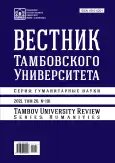Psychological features of the collocational competence development
- Authors: Klochikhin V.V.1
-
Affiliations:
- Derzhavin Tambov State University
- Issue: Vol 26, No 191 (2021)
- Pages: 32-37
- Section: THEORY AND METHODS OF FOREIGN LANGUAGE TEACHING
- URL: https://bakhtiniada.ru/1810-0201/article/view/298355
- DOI: https://doi.org/10.20310/1810-0201-2021-26-191-32-37
- ID: 298355
Cite item
Full Text
Abstract
In connection with the use of the communicative method in foreign language teaching, the collocational competence development becomes especially relevant. Based on the analysis of the researchers’ works on the topic, it is revealed that one of the problems of the collocational competence development is not following the principle of the learning consciousness. The essence of this principle is that the provision of all theoretical information should precede the practice of a foreign language. Perception is highlighted as the initial level of consciousness. It is noted that the perception of the language material by the native speaker and the learner is different. Weak connections between the elements of the learner’s mental vocabulary explain why learners “mix” collocations. Noticing is the next level of consciousness. The analysis of scientific literature has shown that noticing is an important component of the successful study of a foreign language. The conditions that affect operations upon noticing are highlighted. Understanding is the last level of consciousness. The next logical step in the collocational competence development, following the principle of learning consciousness, is the use of communicative and pseudocommunicative tasks to consolidate the conscious theoretical material.
About the authors
V. V. Klochikhin
Derzhavin Tambov State University
Author for correspondence.
Email: cta124@yandex.ru
ORCID iD: 0000-0003-4845-6624
Research Worker of Linguistic Multicultural Education Laboratory
33 Internatsionalnaya St., Tambov 392000, Russian FederationReferences
- Klochikhin V.V. Formirovaniye kollokatsionnoy kompetentsii obuchayushchikhsya na osnove elektronnogo lingvisticheskogo korpusa [Development of collocational competence of students on the basis of electronic lin-guistic corpus]. Vestnik Tambovskogo universiteta. Seriya: Gumanitarnye nauki – Tambov University Review. Series: Humanities, 2019, vol. 24, no. 179, pp. 69-80. doi: 10.20310/1810-0201-2019-24-179-69-80. (In Rus-sian).
- Aksenova I.N. Rol’ kollokatsiy v formirovanii leksicheskikh navykov rechi [The role of collocations in the for-mation of the lexical speech skills]. Vestnik Tambovskogo universiteta. Seriya: Gumanitarnye nauki – Tambov University Review. Series: Humanities, 2019, vol. 24, no. 181, pp. 17-25. doi: 10.20310/1810-0201-2019-24-181-17-25. (In Russian).
- Trifonova I.S., Levenkova A.Y. Formirovaniye kollokatsionnoy kompetentsii u studentov napravleniya «mezh-dunarodnyye otnosheniya» s ispol’zovaniyem metodov korpusnoy lingvistiki [Developing collocational compe-tence of international relations students: a corpus-based approach]. Vestnik Tomskogo gosudarstvennogo universiteta – Tomsk State University Journal, 2020, no. 452, pp. 219-228. doi: 10.17223/15617793/452/27. (In Russian).
- Belyayev V.B. O primenenii printsipa soznatel’nosti v obuchenii inostrannomu yazyku [On the application of the principle of consciousness in teaching a foreign language]. Psikhologiya v obuchenii inostrannomu yazyku [Psychology in Foreign Language Teaching], 1967, pp. 5-17. (In Russian).
- Kjellmer G. A Mint of phrases. In: Cowie A.P. Phraseology: Theory, Analysis, and Applications. Oxford, Oxford University Press, 1991, pp. 123-135.
- Meara P. The study of lexis in interlanguage. In: Davies A., Criper C., Howatt A.P.R. (eds.) Interlanguage. Edinburgh, Edinburgh University Press, 1984, pp. 225-235.
- Schmidt R. The role of consciousness in second language learning. Applied Linguistics, 1990, no. 11, pp. 129-158.
- Ellis R. SLA Research and Language Teaching. Oxford, Oxford University Press, 1997, 280 p.
- Skehan P. A Cognitive Approach to Language Learning. Oxford, Oxford University Press, 1998, 324 p.
- Gass S. Integrating research areas: a framework for second language studies. Applied Linguistics, 1988, no. 9, pp. 198-217.
- Batstone R. Grammar. Oxford, Oxford University Press, 1994, 158 p.
- Lynch T. Seeing what they meant: transcribing as a route to noticing. ELT Journal, 2001, vol. 55, no. 2, pp. 124-132. doi: 10.1093/elt/55.2.124
- Willis J., Willis D. Challenge and Change in Language Teaching. Oxford, Heinemann Publ., 1996, 186 p.
- Korostelev B.C. Kommunikatsiya i psevdokommunikatsiya [Communication and pseudocommunication]. Inostrannyye yazyki v shkole – Foreign Languages for Schools, 1991, no. 5, pp. 17-21. (In Russian).
Supplementary files








